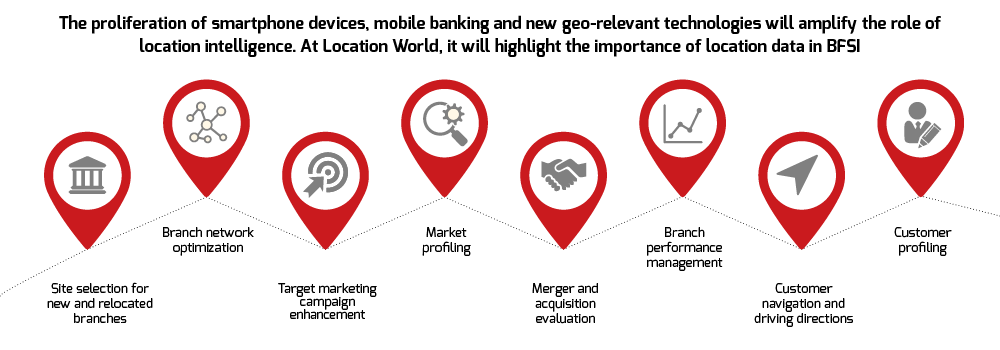Parallel Session

"Banks could generate about $380 billion in annual revenues targeting unbanked consumers in emerging markets."
Banks today are very well capable of introducing location intelligence into their business strategy for inclusive financial services and make the most of the competitive advantage opportunities offered by emerging economies. Location intelligence can mitigate financial and operational risks, and provide specific location identification, ensuring its accuracy, and facilitating the current, historical, and predictive multi-faceted environmental and demographic data. Insurance and banking rely heavily on risk analysis to ensure sustainable operations.

There is increasing demand for hospitals, health systems, and insurers to factor spatial methods into their decision-making processes for both population health needs and clinical care needs. Location technology is playing a major role in providing insights into trends and patterns drawn from data in the form of HD maps, identification of serious and continuous prevailing health issues in a region with LiDAR technologies and formulating targeted strategies that utilize limited resources. Location world will talk about the current trends along with the challenges faced by the industry- analytics, patient engagement, empowerment, and community outreach, system integration, and interoperability.
This session will provide real-world examples of how location can provide context and value to existing patient data in showcasing relationships and patterns that traditional healthcare IT systems can’t detect. For example: hot-spot analysis tools can help in mediating the issues of high re-admittance rates for hospitals by portraying the real-time scenario for widespread epidemic disease in a particular region.
Location World will discuss an insight into:- Current available applications of location technology for healthcare industry from the perspective of return on investment
- Location technology as an enhancement tool to patient and clinical engagement
- Location intelligence as a tool to improve personal health decision-making
Efficiency is essential to gain competitive advantage. Scope of location technology in operation management has evolved over a period of time. Location Intelligence delivers efficiency and applies spatial intelligence in operation management. Location intelligence tools have provided the means to map assets and customer locations and help plan maintenance and service activities - like, through optimized vehicle routing. The geo-referencing capabilities in location intelligence software deployed on mobile devices can alert risk of events such as natural disasters, political upheavals, terrorist attacks, etc. It also provides real-time positioning of vehicles, equipment, and personnel on field to maximize safety and productivity. Location technology results in lower operating costs, increase data quality, better manage risk, streamline business processes, and increase operational efficiency.
Bring the world closer together – Location in supply chain managementLocation technology helps retailers and organization to gain an improved understanding of existing assets and inventories to better manage capital and logistics. Location Intelligence helps retailers plan, manage, and optimize the distribution and retail system around suppliers, distribution centers and store locations. It helps in gaining a better understanding of how the patterns of incidents or outcomes from events may impact supply chains—during unexpected events. It enables managers to drill down a route plan of inventory to supply centers, helping in decisions on optimized supply chain.
Managing supply chain and merchandising efforts becomes easier with the complete geographic visualization including the ability to overlay logistics and costs for shipping lines, air freight, rail transport, and trucking. The solution also helps chains distribute merchandise better, according to changes in geographic demand in the most efficient way.
